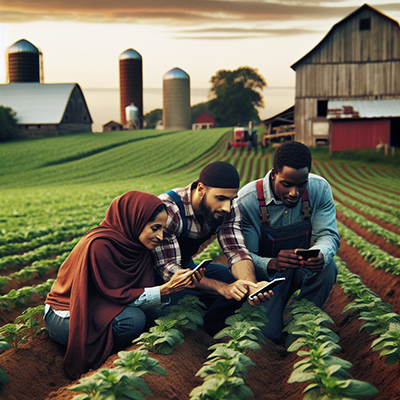As the world grapples with the escalating effects of climate change, sustainability has become the language of the hour. Cultivators, accounting for a noteworthy population of 600 million family farmers, have a crucial role to play in this global endeavor. Utilizing technological advancements like smartphone-based Virtual Reality (VR) can revolutionize how farmers contribute to an eco-friendly environment and smart farming.
Virtual Reality has grown from being a niche technology to an everyday tool thanks to its integration into smartphones. This technology is set to drive a paradigm shift in eco-environment preparedness and agricultural training for farmers. Phone-based VR enables three-dimensional visualization of complex procedures, allowing the farmers to learn and implement sustainable practices right at their fingertips.
The epicenter of this approach is to train the family farmers on climate-smart practices fostering resilience against climate change. The interactive VR modules can simulate varying environmental conditions, enabling farmers to understand the impacts and adaptability techniques in an immersive virtual environment. They can experiment with different approaches to water usage, soil management, crop rotation, and much more, without fearing potential risks to actual crops.
The integration of smartphones in this process makes training more accessible, removing technological and geographical barriers. In areas where traditional education methods are challenging, VR-based modules can be deployed with just a smartphone and VR headset. Such practical training can promote the understanding and adoption of sustainable farming methods right at the farm’s heart.
Instant feedback and analytics from these VR systems can further refine the training process. By assessing the learners’ performance in these virtual scenarios, the system can generate specific feedback, helping them improve their eco-environment management skills over time. This data-driven feedback loop ensures consistent learning and improvement for the farmers.
This innovative approach to farming education through phone-based VR provides a platform for massive upskilling. The ultimate goal is to empower the 600 million family farmers to bring about sustainability in agricultural practices. Over time, this could result in a significant reduction in the environmental impact of farming, contributing to the fight against climate change.
In conclusion, the combination of smartphones and virtual reality could open doors to utopian solutions in farming, enabling an eco-environment friendly, sustainable world. As we incorporate more of these smart technologies into the agricultural sector, farmers will become more equipped to deal with the continuous changes ushered in by our changing climate. Utilizing phone-based VR for large-scale training of family farmers is not just a step towards sustainability; it might just be the leap we need.

